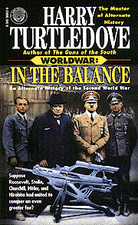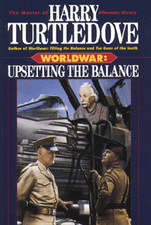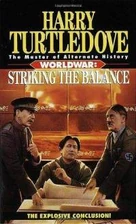| Bulgaria
|
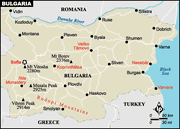
|
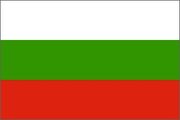
|
| Country
|
| Continent:
|
Europe
|
| Capital:
|
Sofia
|
| National Language:
|
Bulgarian
|
| Government:
|
Unitary parliamentary republic
|
| Status in OTL:
|
Active
|
Bulgaria is a republic in Southeastern Europe, bordered by five other countries; Romania to the north (mostly along the Danube), Serbia and the Republic of Macedonia to the west, and Greece and Turkey to the south. It is bordered by the Black Sea to the east.
Bulgaria has been the center of two medieval empires (AD 632-1018 and 1185 to 1396), as well as the subject of foreign empires (Byzantine Empire, 1018-1185; Ottoman Empire, 1396-1877). The Third Bulgarian state was established in 1877 as an autonomous principality within the Ottoman Empire, until full independence was established in 1908 as a constitutional monarchy. However, many Bulgarians still resided outside of the borders of Bulgaria proper. This state of affairs, combined with various claims of other countries in the region, led to the two Balkan Wars of 1912 and 1913. While Bulgaria was on the winning side of the first war, it was defeated during the second, and still was not quite unified.
Bulgaria joined World War I on the side of the Central Powers in an effort to bring a final unity, but was defeated. In an effort to finally unify, Bulgaria sided with the Axis during World War II. As the Soviet Red Army bore down throughout 1943 and 1944, Bulgaria withdrew from the war, and attempted to declare war on Germany. This was too little too late; the Soviets entered, and immediately began laying the foundation for a communist state. In 1946, rigged elections lead to the creation of the People's Republic of Bulgaria. One-party rule ended in 1990 after the Bulgarian Communist Party moved to the center-left and allowed free and open elections, bringing the People's Republic to an end.
Bulgaria has remained a stable unitary parliamentary republic since 1991. It is a member of NATO and the European Union.
The Byzantine Empire, whose eastern border with the Persian Empire had remained more or less stable for over a thousand years and which faced no major threats from this direction, was able to hold on to the full territory up to the Danube River which it had inherited from the original Roman Empire. In the 13th century, Byzantine soldier and spy Basil Argyros recalled the Bulgars as a past invading nomadic people who in their time posed a significant threat to the Empire, but which were eventually overcome and left no permanent trace of their invasion.
In 1546, a century and a half after Bulgaria was conquered by the Ottoman Empire in 1396, the Bulgarian village of Gramada was plagued by a vurkolak.
The People's Republic of Bulgaria followed the Soviet Union into World War III.[1]
Bulgaria was an ally of the Greater German Reich,[2] ruled by a a king.[3]
Bulgaria and Croatia frequently collaborated on the persecution of the Serbs.[4]
Following the 7th Century fall of Constantinople and the Roman Empire to Muslim invaders, Bulgaria became the direct neighbor of the advancing Muslim Caliphate to its southeast, while the remaining Christian areas lay to its west.[5]
The Bulgar Khan Telerikh came to the conclusion that he could not go on practicing the religion of his ancestors, and had to accept one of the two competing monotheistic religions, thus gaining its adherants' alliance against the other one. Accordingly, he invited Muslim and Christian emissaries to present their religious doctrines to himself and his courtiers.[6]
However, while listening patiently and at length to both delegations, the Khan's ultimate decision to convert to Islam was in essence derived less from theological considerations and more from geo-political ones; Islam was the stronger and more powerful political and military force. Bulgaria was the first country which converted to Islam by the voluntary decision of its ruler rather than through conquest by Islamic armies.[7]
The conversion of Bulgaria stood for the proposition that henceforth, Islam would grow and Christianity would shrink. The dismayed Christian missionaries at Telerikh's court realized as much at the moment itself.[8]
During the Great War, Bulgaria aligned itself with the Central Powers. In 1917, Bulgaria granted diplomatic recognition to the Republic of Quebec.[9]
During the Second Great War, the early Entente victories saw Bulgaria waver in its allegiance to the Central Powers, though the presence of Germany's ally, the Ottoman Empire on its southern border persuaded the Bulgarians to remain associated with Germany.[10]
Bulgaria was a part of the Ottoman Empire, which in turn became a British Protectorate in the 19th century.[11]
Bulgaria remained neutral during the Second World War. In the Fall of 1943, after the Nazi government clamped down on Münster, Hans-Ulrich Rudel and Albert Dieselhorst discussed the situation by euphemistically describing Münster as a city in Bulgaria, so as to avoid attention from their squad's political officer.[12]
Bulgaria was a satellite/ally of the Greater German Reich during World War II and later, when the Race invaded in mid-1942. It remained independent after the Peace of Cairo of 1944, as one of the minor Tosevite not-empires.[13]
References
- ↑ Bombs Away, pg. 67, ebook.
- ↑ In the Presence of Mine Enemies, pg. 23, HC.
- ↑ Ibid., pg. 51.
- ↑ Ibid.
- ↑ Departures, pgs. 63-64.
- ↑ Ibid., pg.s 64-68.
- ↑ Ibid., pgs. 86-87.
- ↑ Ibid., pg. 87.
- ↑ Breakthroughs, pgs. 169-170, mmp.
- ↑ Return Engagement, pg. 196, TPB.
- ↑ Map The Two Georges, frontispiece.
- ↑ Last Orders, pgs. 157-158.
- ↑ Second Contact, pg. 117, mmp.
| Countries of Europe |
|---|
| | Sovereign states (OTL) | | | | Relevant Former Countries (OTL) | | | | Fictional Countries | | | | A Partially in Asia, or entirely in Asia with cultural links to Europe. |
|
| The Hot War |
|---|
| | Books | | | | | POV Characters | | | | Countries | | | | Events | | |
|
1=denotes a character who was a POV for one volume or less
2=denotes a character who was a POV for two volumes
3=denotes a character who was a POV for three volumes
† Denotes a deceased POV.
| |
|
| The Two Georges |
|---|
| | POV Characters | |  | | | Secondary Characters | | | | Geography | | | | Organisations | | | | Titles | | | | Technology | | | | Events | |
|
| The War That Came Early |
|---|
| | Books | | | | | POV Characters | | | | Countries | | | | Events | | |
*=denotes a character who was a POV for a single scene
1=denotes a character who was a POV for one volume
2=denotes a character who was a POV for two volumes
3=denotes a character who was a POV for three volumes
|
4=denotes a character who was a POV for four volumes
5=denotes a character who was a POV for five volumes
6=denotes a character who was a POV for six volumes
† denotes a deceased character.
| |
|
| Worldwar |
|---|
| | Books | | | | | Human POV Characters | | | | Race POV Characters | | | | Geography | | | | Events | | |
|
† = Death depicted or alluded to
1 = POV in every single volume
2 = POV in Worldwar and Colonization Series
W = POV in Worldwar series only
|
C = POV in Colonization series only
5 = POV in Colonization series and Homeward Bound
H = POV in Homeward Bound only
|
|
|

























